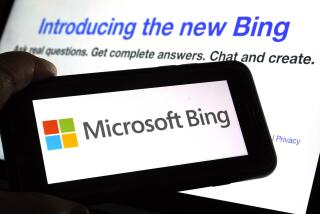Aiming for a kinder, smarter online encyclopedia
- Share via
They wanted to build an online encyclopedia that was more authoritative than Wikipedia. But the volunteers behind Citizendium are learning that writing about, well, everything is no easy task.
“Difficult is an understatement,” said Nancy Sculerati, an associate professor of medicine at New York University who wrote the “Biology” entry.
The 1,000 or so authors and editors working on the website, which went live last month, want to make a smarter, kinder Wikipedia by having experts approve all articles posted on the site. They’re requiring that contributors use their real names, which they say will eradicate some of the vandalism and inaccuracy that have marred Wikipedia.
By allowing anyone to write and edit entries, Wikipedia has amassed 6 million articles in 250 languages since its 2001 launch. It’s a cultural phenomenon, attracting 191 million worldwide visitors in February, according to ComScore Networks.
In many cases, the democratic approach has created detailed entries that can be updated much more quickly than a printed encyclopedia. But in other cases, it has led to factual inaccuracies and doubts about the writers’ credibility.
Last month Essjay, a prolific Wikipedia member featured in a New Yorker article, was found to be a 24-year-old from Kentucky, rather than the tenured university professor he had claimed to be.
In an interview, Wikipedia founder Jimmy Wales defended the website, saying that Essjay’s articles were well-written and accurate, and that the site’s many contributors quickly noticed and corrected mistakes.
Try as they might, Citizendium’s founders are finding it’s pretty tough to do a better job than Wikipedia.
They’ve been working for nearly six months on the Herculean task of agreeing on how to organize all of the information in the world. So far, editors have approved only nine of the roughly 1,000 articles that volunteers have written. Visitors can see all of the entries, but the approved ones are distinguished by a green checkmark. The nonprofit Citizendium has found writers for only six of about 40 topics its editors have identified as most important.
“You simply can’t legislate or give orders to people,” said Larry Sanger of Columbus, Ohio, who founded Citizendium. “It’s a volunteer project, and people will end up doing more work for the project if they feel free to go where their hearts take them.”
Citizendium’s first approved entry was the one that Sculerati, the NYU professor, took a lead in writing. But it went through months of edits and disputes over the wording.
Sculerati called experts in Australia to discuss the article and tried to digest the hundreds of e-mails from contributors that poured into her inbox every day. It was difficult to write about biology using simple language, she said, but it was even harder to please all the experts reading over her shoulder.
For example, Sculerati started by describing biology as the science of life, but she soon received e-mails from people protesting that it was the science of living things. Others wanted her to include the Greek etymology of the word in the entry. When she included a reference to atheist Richard Dawkins, there were complaints that she should leave religion out of the article.
“I got so much grief,” Sculerati said. “I could never have imagined the amount of work this was along the way.”
But the attention to detail is what makes Sanger think that his project will succeed. Sanger, 38, was one of the co-founders of Wikipedia but he had been growing unhappy with the uncivil manners and inaccuracies he said were present on the site.
“We need massive amounts of authoritative content,” he said. “That’s my dream.”
For a few short weeks in the winter, Sanger allowed Citizendium users to register without first gaining approval from the site’s administrators. He said the policy allowed vandals to damage entries. Now that he’s gotten rid of the Wikipedia-like self-registration, he said, the project can be trusted once again.
“The move from Wikipedia to a more professional atmosphere is quite a big one,” said Larry Tribe, a University of Melbourne biotechnology professor involved in Citizendium. “I’ve noticed that people who are used to the Wikipedia atmosphere are rude and inconsiderate.”
Tribe compared Wikipedia to a Neanderthal and Citizendium to Homo sapiens -- a big step up on the evolutionary scale. In February, Vermont’s Middlebury College banned students from citing Wikipedia in their schoolwork, but Tribe said he hoped colleges would allow academic citations to Citizendium because of its peer-review process.
But requiring experts’ participation brings its own set of problems.
For example, Encyclopedia Britannica, an authoritative source that has been in existence since 1768, assembled a team of 100 editors to rework contributions from 4,000 experts the world over. Spokesman Tom Panelas called the editorial process “very rigorous” and said submissions sometimes required months of editing. Britannica’s staffers and contributors get paid -- unlike contributors to Wikipedia and Citizendium.
Sanger believes that asking experts to write for free means they’ll cover the issues they’re most passionate about. The first nine approved Citizendium entries cover some fairly technical topics: biology, chemistry, chiropractic, horizontal gene transfer, metabolism, RNA interference, vertebral subluxation, wheat and pioneering scientist Barbara McClintock.
The typical Internet user might be looking for something different. According to a chart on Wikipedia compiled by one of its contributors, the 20 most-viewed articles in February included “Anna Nicole Smith,” “Sex,” “List of sex positions” and “World War II.” The Anna Nicole Smith article, at No. 2, received nearly 90,000 page views each day.
Sanger said that Citizendium’s vast gaps of information would be filled in time.
Wales tried the expert approach before he helped start Wikipedia. An earlier site, Nupedia, only allowed articles written by experts, which were then subject to extensive review.
“Nupedia really was a complete failure,” Wales said. “You really had to battle your way through the system to get something published.”
Citizendium is trying to chart a course between Wikipedia and Nupedia, said Mike Johnson, who serves on Citizendium’s executive board. He also is a so-called constable, patrolling the site to make sure that users are behaving themselves.
He thinks the project can improve the state of knowledge in the world by providing more accurate information than Wikipedia. With a collegial atmosphere and Sanger’s experience working on user-created encyclopedias, Citizendium is off to a good start, Johnson said.
“Wikipedia proved that a group of committed volunteers can start an encyclopedia from scratch,” he said. “Nobody’s come up with a convincing reason ... why we can’t do a better job of it in virtue of hindsight.”
*







